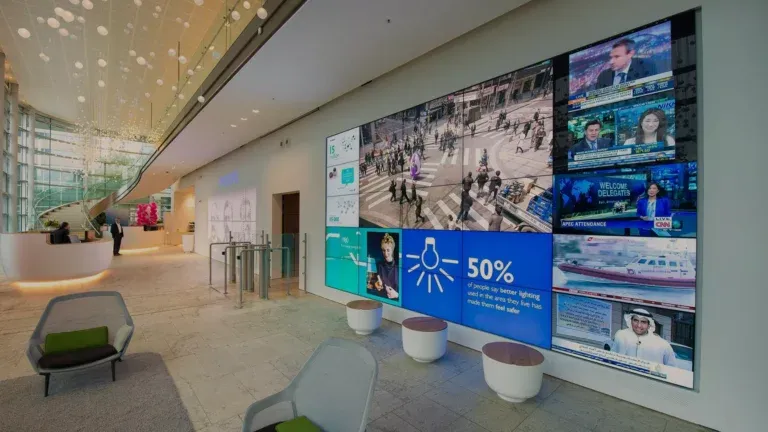Application of artificial intelligence in outdoor digital advertising in 2024
The realm of outdoor digital advertising is undergoing a profound transformation, driven by the combined forces of big data and AI.
This transformation is noticeable not only to marketers and advertisers but also to consumers, who now see personalized ads tailored to their current interests and search history. In the realm of online advertising, chatbots have been assisting users by responding to queries and guiding decision-making for quite some time. So, what exactly is AI-driven advertising, and how can it be harnessed in DOOH?
AI-driven advertising leverages technology to mimic human behavior by utilizing machine learning on extensive datasets. This involves predicting patterns, creating precise and impactful contexts, and devising strategies for delivering relevant ads to the target audience through a Digital Signage player.
To achieve this, historical data from a variety of sources are analyzed, enabling AI to make increasingly informed decisions over time. By leveraging AI, advertisers can craft more personalized advertisements, accurately target specific audiences, and swiftly select ad displays within any DOOH network.
What AI advertising consists of
AI-based advertising may include the following technologies:
Machine Learning
Cognitive advertising algorithms rely on artificial intelligence and computer algorithms to process information and autonomously enhance content placement via an AI-integrated digital signage player. Devices utilizing machine learning technology can evaluate new data in the context of pertinent historical information. This analysis will guide future decision-making, identifying strategies that were effective or ineffective in the past.
Big data and analytics
With the advent of digital media channels, marketing and cybersecurity professionals have brought Big Data technology to the forefront. It allows assessing which advertising strategies and sales channels are most effective. Another important source of large datasets is cellular operators and Wi-Fi sniffers installed on digital advertising structures such as LED boards or facade screens.
Effective AI platforms
To effectively manage large datasets, specialized AI platforms can be used. They are capable of obtaining valuable marketing information about the target audience and, based on this, making the right decisions for ad displays at locations, for example, Digital Signage Kyiv.
What awaits AI
Advertisers who are not yet using artificial intelligence to optimize advertising should pay attention to this technology. Researchers predict significant growth in AI presence in the advertising market over the next decade.
AI helps companies better segment audiences for launching advertising campaigns. It also allows for the creation of targeted ads while measuring the results.
Specialists from the American marketing company HubSpot report that modern marketers create content for many different audiences, not just one. Three is the minimum. It is now pointless to create advertisements for only one audience and hope for the best.
To achieve better results, companies use AI. This allows for more precise targeting of niche groups of potential buyers. With the help of artificial intelligence, ads are shown to the right people.
Measuring the success of an advertising campaign and strategies is easier with artificial intelligence. Thanks to the transparency and accuracy of analyzed data, it is easier for advertisers to understand what is worth investing in.
The advertising industry, which uses AI, will continue to evolve along with the digitalization of the modern world. Advertisers already have the opportunity to take advantage of the many benefits of this technology. Let’s take a closer look at how artificial intelligence is changing the digital advertising ecosystem and how companies can use this knowledge to create more consistent strategies.
How AI is changing the advertising market
Artificial intelligence technology is rapidly changing the landscape of the advertising market, as it can self-learn and become relevant as an intelligent system for digital signage. Here are just a few of the ways it can be used to optimize advertising.
Personalized leads for a better user experience
To improve user experience and reach the target audience, marketers and advertisers use data to personalize advertisements. Such data include demographic information, interests, purchase intentions, and behavior patterns.
Increasing ad relevance and personalization is becoming a top priority for marketers: 80% of users who consider themselves frequent shoppers say they purchase from companies that offer them personalized offers based on their interests and user experience.
AI solutions such as conversational marketing help advertisers build personal communication with consumers and provide better offers to potential buyers. In fact, 71% of shoppers prefer real-time communication with brand representatives. This is why marketers and business owners have increasingly started using conversational AI marketing to interact with customers through cloud-based digital signage.
Audience segmentation before ad display
With the help of machine learning, a form of AI, advertisers can identify behavioral patterns of the target audience and create offers that interest them at the moment. Carefully segmented audiences and properly selected ad content can ensure a higher conversion rate, turning LED software into a more productive tool.
For this, machine learning analyzes all available information about a specific user, such as demographic data and online behavior. The obtained data influence the choice of the type of content the user wants to see at a given moment. Information quickly enters the Digital Signage management software and is displayed on the screen.
AI-created ads convert better
With AI, it is possible to analyze previous trends and performance metrics to create higher quality ad texts that will convert better. In this case, marketers go beyond standard A/B testing and use data to predict how creative content and text will resonate with potential customers. This allows advertisers to proactively create creatives and generate higher quality leads and conversions.
Not long ago, specialists from Salesforce’s research department conducted a study on “Enterprise Technology Trends.” The study showed the following: 83% of IT leaders state that artificial intelligence and machine learning are changing customer interactions, and 69% state that they are changing their business and approaches when choosing screen software.
Interactive experience
AI can create a more interactive experience within conversational marketing. It allows launching advertising campaigns based on online customer interactions during live communication.
Interactive marketing tools, such as conversational marketing, help create advertising campaigns based on online customer interactions through website widgets, social networks, smart devices, and more. Computer vision with conversational artificial intelligence and machine learning brings personal experience into the digital ecosystem and platforms. These interactions are personalized and based on the desires and needs of target DOOH advertising customers.
AI and ROI
Artificial intelligence is an analytical approach to advertising. AI tools process vast amounts of information and data to accurately predict future trends and gain analytical insights.
The best thing about AIis that it constantly improves like a human. It learns and adapts as needed, allowing for more effective decision-making in the future.
Advertisers may struggle to assess the effectiveness of advertising campaigns. This is where AI analytics comes to the rescue, helping to determine which strategies work and which do not. Thus, in the future, advertisers can take proactive steps and make decisions that positively impact their campaigns.
According to a study by the international audit and consulting firm Deloitte, 73% of marketers and business owners who use AI technology in their work believe it is “very” or “critically” important to their business. Additionally, 64% stated that they gained a competitive advantage through the use of AI. Personalized offers to the target audience with the right content help reduce advertising costs and increase return on investment. Most respondents initially tried free Digital Signage software before transitioning to more functional CMS.
Performance optimization
Optimizing performance with AI also impacts targeting and allows for savings on research conducted using outdated methodologies. By analyzing real-time data and adapting strategies dynamically, AI enhances ad relevance and audience engagement. Moreover, AI-driven insights enable advertisers to fine-tune their campaigns with unprecedented precision, maximizing ROI and minimizing wasted ad spend.
Challenges of AI in advertising
Advertisers rarely understand how algorithms work and how unconscious bias can be encoded into the meaning and message of the advertising text. This can negatively affect the effectiveness of the entire campaign and the ROI.
Essentially, this can become an issue for advertisers who optimize texts using artificial intelligence. Machine learning technology, if properly deployed in an indoor TV player, can help reduce such bias.
As the advertising industry increasingly turns to artificial intelligence for audience segmentation and campaign execution, more decisions are being made by machines. Marketers using AI strive to remain objective in their decisions.
However, other users who are not experts in AI technology often do not understand how algorithms work and what meanings can be embedded in these models. In this case, decisions may be made based on unintended signals, such as age or race, introducing bias into the campaign.
Training time and data quality
AI tools are not always capable of assessing which decisions need to be made to achieve all goals. To improve algorithms, they must learn from the company’s data, customer preferences, and historical trends of previous digital out-of-home advertising campaigns.
Moreover, they must ensure data quality. If AI tools are not trained to work with accurate, timely, and representative data, they will make less effective decisions.
Data privacy
Marketing teams are responsible for safeguarding clients’ personal data. If data integrity is compromised, companies risk facing severe fines, other liabilities, and damage to their business reputation. This can become one of the challenges of AI advertising, but hopefully, with the help of intelligent individuals, we will overcome it.
Advision — Content Management System for remote management and media planning of broadcast video and audio content. We help offline businesses and advertising companies automate workflows and implement a robust Digital Signage infrastructure using our proprietary software and hardware solutions.
Contact us, and we will help you implement the most modern technologies to solve your problems!
Share the news




















